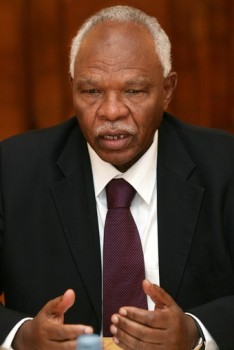Sudan cabinet calls for informing citizens on economic conditions
April 24, 2009 (KHARTOUM) — The Sudanese ministry of finance and national economy, submitted a report to the cabinet outlining the actual indicators compared to budget during the first quarter.

The cabinet spokesperson Omer Mohamed Saleh told reporters that the decline in economic performance is driven by services sector and slowdown in industrial and agricultural sectors.
He also revealed that foreign currency reserves took a plunge affecting unfavorably the exchange rate of the Sudanese pound to the US dollar.
Sudan is heavily dependent on oil exports but as crude prices fell due to worldwide recession and officials in Khartoum called for shifted focus on other sectors including agriculture and industry as well as improving the efficiency of tax and customs collection.
Sudan’s 2009 budget introduced tax hikes including duties on imported vehicles and indirect taxes on telecom services to make up for falling oil prices.
But the spokesperson hailed the policies of the central bank allowing it to subsidize electricity, providing support to Sudan TV, promoting agricultural organizations, paying off agricultural taxes for states, paying arrears for Government of South Sudan (GoSS), paying dues of hospitals, child medications and national fund for sponsoring students.
He said that the cabinet headed by Sudanese president Omer Hassan Al-Bashir instructed that citizens should be informed of the impact of world economic and financial crisis on Sudan.
Sudanese officials have initially sought to downplay the effects of the global crisis on the economy saying that US sanctions provided “immunity” from negative consequences.
This week Sudan’s central bank governor Saber al-Hassan told Reuters said that economic growth will slow to 5 percent as opposed to an average of 8 percent over the last few years.
(ST)

Ayuen Buol mum
Sudan cabinet calls for informing citizens on economic conditions
My fellow minister of finance…I advice you to change the system of exchange rate…to be raise to 20 per a dollar, otherwise it will affect the economy serverly…flexable exchange rate can be good if the international market fluctuated….and can save the economy from financial crisis. especially…the 2 pound per a dollar will make the economy to be more deteriorated and lower output growth. if the oil price drop and the exchange rate is fixed than you will have less output to gain from the trade.
just a piece of advice.
Thanks
babiker
Sudan cabinet calls for informing citizens on economic conditions
I think cabinet must start think in a brave manner, thanks that they finally acknowledged the crisis and beg to inform public the bad news..!!
They must reevaluate the monetary policies adopted by central bank during the last couple of years.. what the economy is suffering was dating back years ago, its a misjudgement blaming the world crisis for our pitfalls in financial policies..
For years policy makers keep talking abt double degit inflation, curtailing expansion in production capacities, curtailing financing development projects by depriving finance against Securities and pledges issued by Min of Finance .. and hence made the economy loses the stimulous of Government development spending, which could have multiplied in multi folds of private sector economic performance..
These financial policies which we were adopting for the last couple of years if evaluated with results were catastrophic, they ended with: collapsing banking system, loss of financial credibility to trade and finance foreign partners, weak private sector, weakening manufacturing and farming capacities, multiple of thousand of business leaders behind bars..
We first have to think of a financial policy that cares for expanding productive capacities, by funding productive activities, infrastructure, herd raising, transport, storage, communication, instead of caring for the DOUBLE DEGIT inflation.. which finally broke the record and went out of controle due to poor production capacities..
Pls think it loudly and recorrect it soon..
Nagi Babiker